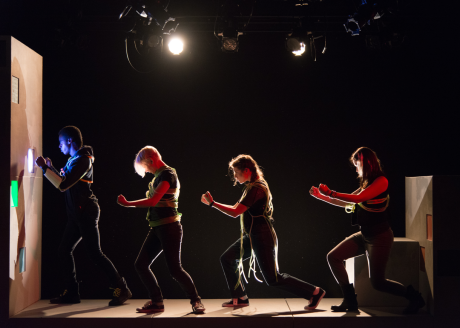
A hand creeps, spider-like, across a shin. Above the shin and the hand, Riley (Mary Tuomanen) is bragging about stealing gluten free beer from the sketchiest grocery store in Atlanta. When she laughs, she whips her body back and forward, her bleach-blonde hair following. The shin and the hand are hers, and the slowness of the approach is a testament to the anxiety and uncertainty of high school. In a rainbow-colored sweater, Diskit (Anna Szapiro), giggles along.
In LOCAL GIRLS, Azuka Theatre’s world premier production of Emma Goidel’s newest play, three young metalheads need to replace the “screamer” in their band before battle of the bands. Enter Diskit, chemistry-loving daughter of a failed composer. Worlds collide, and when Diskit expresses her rage at the collapse of her nuclear family, it sometimes comes out in an excellent metal scream.
The tension at the core of the play is the muddy, pseudo-romantic attraction between friends which adds stakes to the friendship of Diskit and Riley, the band’s lead guitar. Director Allison Heishman cannily keeps leaves this attraction in the world of mystery. Riley’s creeping hand never reaches Diskit’s leg, and there is no attempt to make sophisticated romantics of these kids; instead, Heishman lets the romance remain potential and the friendship stay undefined. This way, the confusion and uncertainty of high school is front and center.
There are plenty of stories about this exact thing (“we’ve gotta save the band” / grunge meets wealth, worlds collide). But playwright Emma Goidel nails the aimless rage of adolescence. No matter how picture perfect and pretty Diskit is at school, when she shares an awkward meal with her father, there’s nothing he can say that doesn’t elicit an angry response. There is nothing this well-meaning and basically harmless father can say that doesn’t embarrass his kid.
LOCAL GIRLS doesn’t say much. Its message is along the lines of “high school is tough, and forgiveness is important.” But Goidel has written a funny, tight script, with well-defined and subtle characters, and Heishman shows a sophisticated understanding of how to make a play stand on stage. No laugh is missed—even when they’re hidden in the middle of serious speeches—and scenes push hard on one another, no real gaps in action.
Tuomanen and Szapiro, whose stage time easily eclipses that of the other performers, handle Goidel’s subtle touches well. Each finds the core of rage which make these characters feel real, and which brings back the uncertainty of high school with frightening potency.
[The Drake, 1512 Spruce] February 24-March 13, 2016; azukatheatre.org.
